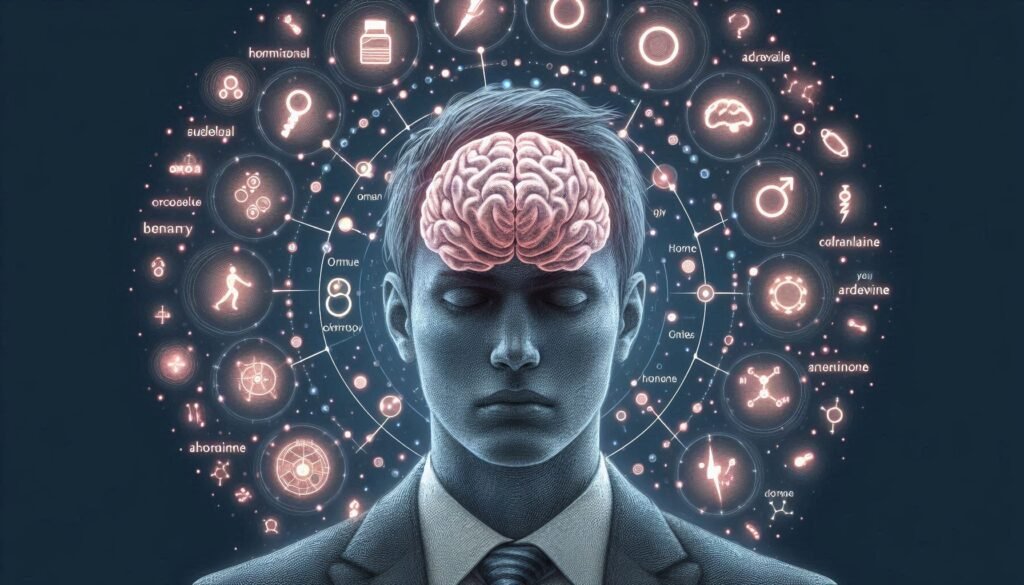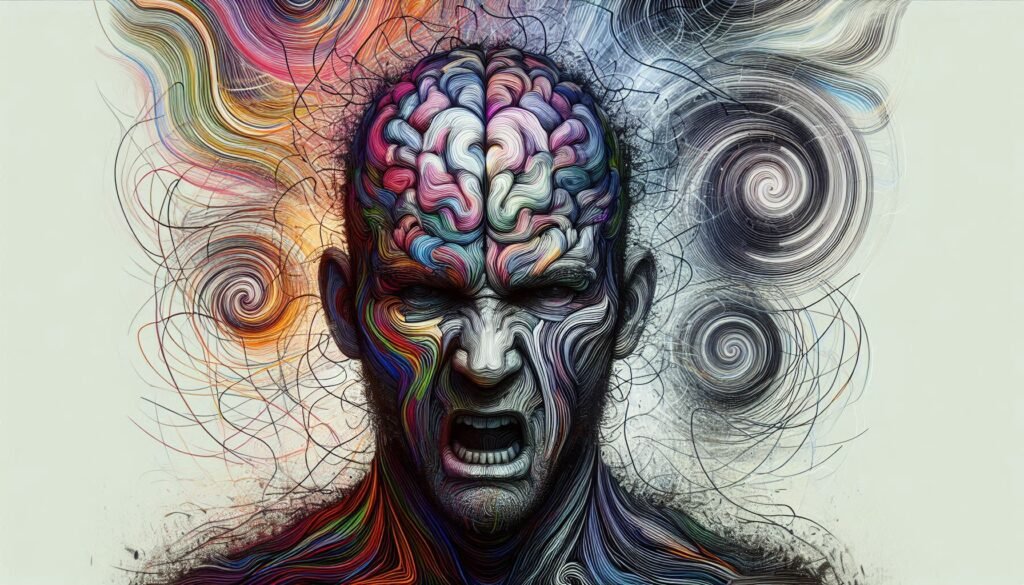Concussions are often perceived as isolated brain injuries, but the aftermath can extend far beyond immediate neurological effects. Emerging research reveals a complex interplay between concussions and the endocrine system. Neurohormonal disruptions post-concussion may not only hinder recovery but also lead to long-term health issues that many might overlook.
When an individual suffers a concussion, it’s easy to focus on headaches or cognitive challenges. However, hormonal imbalances triggered by such brain trauma can significantly impact overall well-being. From mood swings to metabolic changes, these disruptions can alter daily life in profound ways.
As we delve into this intricate connection between brain injury and hormonal function, understanding how our bodies respond after a concussion becomes crucial for effective management and recovery. Let’s explore what happens when neurohormones get disrupted following head trauma and why addressing this issue is vital for holistic healing.

The Intricate Connection Between Brain Injury and Hormonal Function
Brain injuries, particularly concussions, can have far-reaching effects on various bodily systems. One of the most affected is the endocrine system, responsible for hormone production and regulation. Hormones act as messengers that influence everything from mood to metabolism.
When a concussion occurs, it can disrupt the delicate balance of these hormones. The brain’s regulatory centers often struggle to maintain normal function in response to injury. This disruption can lead to altered levels of critical hormones such as cortisol, thyroid hormones, and sex steroids.
Cortisol, known as the stress hormone, may become dysregulated after head trauma. Elevated or diminished levels can exacerbate fatigue and anxiety during recovery. Similarly, imbalances in thyroid hormones could affect energy levels and cognitive performance.
Understanding this connection between brain injury and hormonal function highlights the importance of addressing both neurological health and endocrine balance post-concussion. Awareness of these changes allows individuals to seek comprehensive care tailored specifically for their needs during recovery.
Hypothalamic-Pituitary Axis Dysfunction Following Concussion
The hypothalamic-pituitary axis (HPA) plays a crucial role in regulating various hormonal functions. Following a concussion, this intricate system can become dysregulated, leading to significant endocrine disruptions. The impact of head trauma on the HPA may disrupt the delicate balance between hormones like cortisol and adrenaline.
When the HPA is affected after a concussion, it can lead to an exaggerated stress response. This results in fluctuating levels of cortisol, which can affect mood and energy levels. A consistently high or low cortisol level may also contribute to anxiety and depression in individuals recovering from brain injuries.
Research indicates that even mild concussions can initiate changes within the HPA. These alterations may persist for months or even years after the initial injury, complicating recovery efforts. Understanding these dynamics is vital for healthcare providers aiming to address both physical and emotional symptoms post-concussion.
Monitoring hormonal fluctuations becomes essential in managing long-term health outcomes following traumatic brain injuries. Timely interventions targeting HPA dysfunction could improve overall recovery trajectories significantly.
Common Endocrine Disturbances in Post-Concussion Syndrome
Post-concussion syndrome can lead to a range of endocrine disturbances that significantly impact recovery. One prevalent issue is hypopituitarism, where the pituitary gland fails to produce adequate hormones. This condition can affect growth hormone, thyroid-stimulating hormone, and others, leading to fatigue and metabolic imbalances.
Another common disturbance involves cortisol levels. Many individuals experience dysregulation in their stress response system, resulting in either excessive or inadequate cortisol production. This imbalance can contribute to anxiety and difficulty managing stress during recovery.
Thyroid dysfunction also frequently emerges following a concussion. Patients may present with symptoms of hypothyroidism such as weight gain, lethargy, or depression due to reduced hormone levels affecting metabolism.
Additionally, reproductive hormone fluctuations are observed more often among females post-injury. Irregular menstrual cycles or changes in libido might occur as hormonal signaling becomes disrupted by brain injury dynamics. These endocrine changes warrant careful monitoring for effective recovery strategies.
Gender Differences in Neurohormonal Responses to Head Trauma
Gender plays a crucial role in how individuals respond to neurohormonal disruptions post-concussion. Research indicates that women and men exhibit different hormonal responses when faced with head trauma. These differences can influence recovery trajectories and symptom profiles.
Women often experience more significant endocrine disturbances, particularly involving hormones such as estrogen and progesterone. Fluctuations in these hormones may exacerbate symptoms like anxiety or depression following a concussion. This is especially evident during certain phases of the menstrual cycle, which can complicate the healing process.
Men, on the other hand, tend to show variations primarily in testosterone levels after concussive injuries. Low testosterone has been linked to increased fatigue and cognitive impairments post-injury. Understanding these differences is vital for tailoring treatment strategies effectively.
Additionally, societal factors play into recovery experiences based on gender norms. Awareness of these disparities helps healthcare providers create personalized recovery plans that consider both physiological and psychological needs unique to each gender’s response to brain injury.
Diagnostic Approaches for Identifying Post-Concussion Hormonal Imbalances
Identifying neurohormonal disruptions post-concussion involves a multi-faceted diagnostic approach. Initially, healthcare providers conduct comprehensive patient interviews to gather detailed medical histories. This includes discussing symptoms experienced after the concussion, as well as any changes in mood, energy levels, or cognitive function.
Laboratory testing plays a critical role in diagnosis. Blood tests are commonly used to measure hormone levels such as cortisol, thyroid hormones, and sex hormones. Abnormal results can indicate dysfunction within the hypothalamic-pituitary axis.
Advanced imaging techniques may also be utilized to assess brain structure and function. MRI scans can help identify potential injuries that might contribute to hormonal imbalances by highlighting areas of inflammation or damage.
Neuropsychological assessments provide further insight into cognitive and emotional impacts resulting from hormonal changes. These evaluations help create a clearer picture of how endocrine disturbances affect overall health and recovery following a concussion.
Treatment Options for Concussion-Related Endocrine Disorders
Treatment options for concussion-related endocrine disorders vary based on the specific hormonal imbalances identified. Hormone replacement therapy is a common approach when there’s significant deficiency, such as low cortisol or thyroid hormones. This method can help restore balance and alleviate symptoms.
Lifestyle modifications also play a critical role in treatment. A balanced diet rich in nutrients supports overall hormonal health, while regular exercise can enhance energy levels and mood stability. Adequate sleep is essential too; it aids recovery and hormone regulation.
Psychotherapy may benefit individuals experiencing emotional disturbances linked to neurohormonal disruptions post-concussion. Cognitive-behavioral therapies (CBT) can address anxiety and depression that often accompany these conditions.
Furthermore, monitoring by healthcare professionals ensures adjustments are made as needed during recovery. Regular check-ups allow for timely interventions if symptoms persist or worsen over time, making comprehensive care vital for optimal outcomes.
The Role of Stress Hormones in Post-Concussion Recovery
Stress hormones, particularly cortisol, play a crucial role in the recovery process after a concussion. Following an injury, the body enters a state of heightened alertness, releasing these hormones to manage stress and promote survival. However, excessive cortisol can hinder healing by impairing brain function and disrupting neurotransmitter balance.
Elevated levels of stress hormones may also exacerbate symptoms associated with post-concussion syndrome. This includes cognitive difficulties such as memory problems and concentration issues. By influencing mood regulation, they can contribute to feelings of anxiety or depression that often accompany head injuries.
Moreover, prolonged exposure to high stress hormone levels can impact sleep patterns essential for recovery. Poor sleep quality further complicates healing efforts by reducing energy levels and slowing down cognitive processing.
Understanding this complex relationship between stress hormones and recovery is vital for effective treatment strategies following a concussion. Addressing these hormonal imbalances can lead to improved outcomes and overall well-being for individuals navigating post-concussion challenges.
Impact of Hormonal Disruptions on Cognitive and Emotional Function
Hormonal disruptions post-concussion can significantly impact cognitive and emotional functions. The brain relies on a delicate balance of hormones to maintain optimal performance. When this balance is disrupted, individuals may experience difficulties with memory, attention, and decision-making.
Cortisol, often referred to as the stress hormone, can become dysregulated following a concussion. Elevated cortisol levels may impair learning processes and increase anxiety. This creates a cycle where cognitive challenges lead to heightened stress responses.
Additionally, low levels of thyroid hormones have been linked to fatigue and depression in those experiencing post-concussion syndrome. Such emotional disturbances can further hinder recovery by affecting motivation and overall mental health.
Clinical studies show that patients with hormonal imbalances report higher instances of mood swings and irritability. These changes not only affect personal relationships but also impact professional life, leading to broader implications for daily functioning after head trauma.
Long-Term Consequences of Untreated Neurohormonal Imbalances
Untreated neurohormonal imbalances after a concussion can lead to significant long-term consequences. Hormones play crucial roles in regulating mood, energy levels, and cognitive function. Disruptions in this delicate balance often manifest as chronic fatigue or anxiety disorders.
Patients may also experience persistent memory issues and difficulty concentrating, hindering daily activities and overall quality of life. Cognitive decline is common, especially if hormonal disturbances are left unaddressed for extended periods.
Moreover, untreated hormonal imbalances can exacerbate physical health problems such as metabolic syndrome or autoimmune conditions. This creates a cycle where one issue feeds into another, leading to further complications.
Emotional stability can also be compromised due to prolonged hormone dysregulation. Individuals may find themselves more prone to mood swings or depression, leaving them feeling isolated and overwhelmed by their symptoms. Recognizing these risks early on is essential for effective management and recovery strategies.
Monitoring and Management Strategies for Ongoing Hormonal Health
Monitoring and managing neurohormonal disruptions post-concussion is essential for long-term recovery and overall well-being. Regular evaluations by healthcare professionals can help track hormonal levels, ensuring any imbalances are identified early. This may involve blood tests to assess hormone levels such as cortisol, thyroid hormones, and sex hormones.
Integrating lifestyle modifications can also play a crucial role in supporting hormonal health after a concussion. A balanced diet rich in nutrients supports the endocrine system while regular physical activity enhances mood and cognitive function. Mindfulness practices like yoga or meditation can alleviate stress responses that often accompany hormonal imbalances.
Additionally, working with specialists—including endocrinologists and neurologists—can provide targeted interventions tailored to individual needs. Hormone replacement therapies might be considered if significant deficiencies are detected.
Open communication between patients and providers fosters an environment conducive to healing. Engaging in ongoing therapy or counseling can further assist individuals in coping with emotional disturbances linked to hormonal changes resulting from concussions.
By proactively monitoring these aspects of health, individuals can significantly improve their recovery trajectory following head trauma. Enhanced awareness surrounding neurohormonal disruptions paves the way for better outcomes both physically and mentally after experiencing concussion-related challenges.


